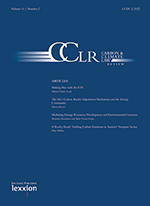
Free, Prior and Informed Consent (FPIC) for REDD+: Insights from Cameroon national FPIC guidelines. Carbon, Climate & Law Review 9(2):156-16
Year of publication: 2015
Authors: Carodenuto, S.; Fobissie, K
Abstract
The international legal framework for Reducing Emissions from Deforestation and Forest Degradation in Developing Countries, plus the role of Conservation, Sustainable Forest Management, and Forest Carbon Stock Enhancement (REDD+) provides a regime for advancing forest conservation while also respecting human rights, through a mechanism referred to as the “safeguards”. Under the international framework, REDD+ countries are granted the flexibility to further interpret and enforce these safeguards within their national territories. Cameroon’s national government called for the development of Free, Prior and Informed Consent (FPIC) guidelines as part of its safeguarding efforts to ensure REDD+ activities not only avoid undue harm to local forest communities, but promote respect for the human rights of indigenous peoples and improve forest governance related to stakeholder participation. Although the validation of these guidelines marks the success of civil society coalitions advocating for social safeguards at the national level, achieving progress on FPIC is hampered by a number of legal and institutional barriers, including the non-binding nature of the FPIC guidelines and the challenges facing the Ministry of Environment in enforcing compliance. Nonetheless, the validation of these FPIC guidelines represents a step forward in advancing human rights and environmental justice in a country where the participation and representation of forest communities and indigenous peoples in natural resource governance has been largely absent.
